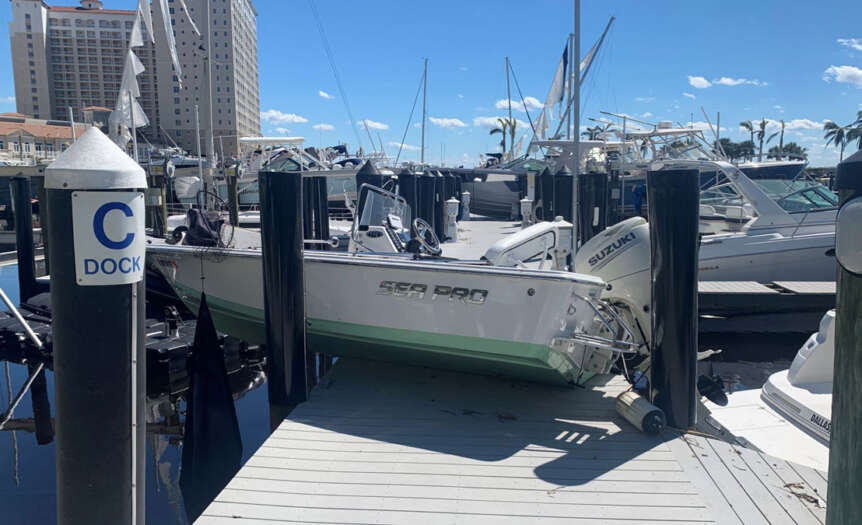With the remnants of Hurricane Ian heading off into the Atlantic, boat owners in Florida, Georgia, South and North Carolina are starting recovery efforts. To help those affected, Boat Owners Association of These United States (BoatUS) offers five tips to help recover recreational vessels and begin the salvage process.
“The goal for any boat owner is to try to prevent further damage if possible,” said BoatUS vice president of public affairs Scott Croft. “That will help potentially lessen repairs and get you back on the water sooner.”
- Get permission first. Never try to enter a storm-affected marina or boat storage facility without it. Bring proof of ownership. Spilled fuel combined with the potential of downed electrical wires and a host of other hazards make them extremely dangerous places. Don’t even think of smoking. Stay off docks until it is safe to do so and never climb in or on boats that have piled up together or are dangling precariously from dock pilings or other obstructions.
- Remove valuables. If your boat has washed ashore, remove as much equipment as possible and move it to a safe place to protect it from looters and vandals. It’s a good idea to put your name, telephone number, address and email somewhere conspicuously on the boat – along with a “No Trespassing” sign.
- Minimize further damage. Protect your boat from further water damage resulting from exposure to the weather. This could include covering it with a tarp or boarding up broken windows or hatches. As soon as possible, start drying out the boat, either by taking advantage of sunny weather or using electric air handlers. All wet materials, such as cushions, must be removed and saved for a potential insurance claim. The storm may be gone, but the clock is ticking on mold growth.
- “Pickle” wet machinery. Engines and other machinery that were submerged or have gotten wet should be “pickled” by flushing with freshwater and then filled with diesel fuel or kerosene. Here’s how.
- Consult your insurance provider. If your boat is sunk or must be moved by a salvage company, BoatUS recommends that boat owners should not sign any salvage or wreck-removal contract without first getting approval from their insurance company. Proceeding without your insurer’s knowledge and approval may jeopardize your coverage.
Additional post-hurricane boat recovery tips can be found here.










 Deering Estate
Deering Estate
 Massage Envy South Miami
Massage Envy South Miami
 Calla Blow Dry
Calla Blow Dry
 My Derma Clinic
My Derma Clinic
 Sushi Maki
Sushi Maki
 Sports Grill
Sports Grill
 The Healthy Kitchen
The Healthy Kitchen
 Golden Rule Seafood
Golden Rule Seafood
 Malanga Cuban Café
Malanga Cuban Café

 Kathleen Ballard
Kathleen Ballard
 Panter, Panter & Sampedro
Panter, Panter & Sampedro
 Vintage Liquors
Vintage Liquors
 The Dog from Ipanema
The Dog from Ipanema
 Rubinstein Family Chiropractic
Rubinstein Family Chiropractic
 Your Pet’s Best
Your Pet’s Best
 Indigo Republic
Indigo Republic




 ATR Luxury Homes
ATR Luxury Homes


 2112 Design Studio
2112 Design Studio
 Hamilton Fox & Company
Hamilton Fox & Company
 Creative Design Services
Creative Design Services
 Best Pest Professionals
Best Pest Professionals
 HD Tree Services
HD Tree Services
 Trinity Air Conditioning Company
Trinity Air Conditioning Company
 Cisca Construction & Development
Cisca Construction & Development
 Mosquito Joe
Mosquito Joe
 Cutler Bay Solar Solutions
Cutler Bay Solar Solutions


 Miami Royal Ballet & Dance
Miami Royal Ballet & Dance
 Christopher Columbus
Christopher Columbus
 Pineview Preschools
Pineview Preschools
 Westminster
Westminster
 Carrollton
Carrollton
 Lil’ Jungle
Lil’ Jungle
 Frost Science Museum
Frost Science Museum
 Palmer Trinity School
Palmer Trinity School
 South Florida Music
South Florida Music
 Pinecrest Orthodontics
Pinecrest Orthodontics
 Dr. Bob Pediatric Dentist
Dr. Bob Pediatric Dentist
 d.pediatrics
d.pediatrics
 South Miami Women’s Health
South Miami Women’s Health

 The Spot Barbershop
The Spot Barbershop
 My Derma Clinic
My Derma Clinic




 Miami Dance Project
Miami Dance Project

 Rubinstein Family Chiropractic
Rubinstein Family Chiropractic
 Indigo Republic
Indigo Republic

 Safes Universe
Safes Universe
 Vintage Liquors
Vintage Liquors
 Evenings Delight
Evenings Delight





 Atchana’s Homegrown Thai
Atchana’s Homegrown Thai
 Baptist Health South Florida
Baptist Health South Florida

 Laser Eye Center of Miami
Laser Eye Center of Miami
 Visiting Angels
Visiting Angels
 OpusCare of South Florida
OpusCare of South Florida

 Your Pet’s Best
Your Pet’s Best





 HD Tree Services
HD Tree Services
 Hamilton Fox & Company
Hamilton Fox & Company


 Creative Design Services
Creative Design Services